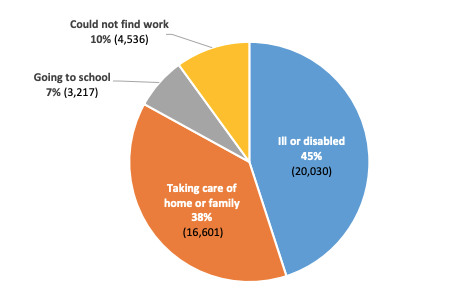The Demographics of Missouri Medicaid: Implications for Work Requirements
Bottom Line: A Medicaid work requirement in Missouri would not only have a limited reach but also the characteristics of recipients also suggest that they would face challenges in the workforce.
As a Medicaid non-expansion state, Medicaid work requirements in Missouri would potentially apply to a small proportion of the total Medicaid enrollees — fewer than an estimated 55,700 individuals (low-income parents) of over 900,000 enrolled in the program overall. About 45,400 of these estimated 55,700 enrollees are not meeting the proposed minimum of hours worked per week.
Of those not working, 45 percent reported illness or disability as the primary reason for not working; 38 percent reported taking care of home or family, 7 percent were going to school, and 10 percent were looking for work. In total, 9 out of 10 recipients who did not work reported illness or disability, taking care of the home or family, or going to school, as the primary reason for not working. A large share of these recipients could be excluded from a work requirement
Low-income parents and caregivers who are not meeting proposed work requirements are likely to be older, in worse health, and less educated. About one third are ages 46 or older, 38 percent report fair or poor health, and 37 percent have less than a high school level education (only 14 percent hold an associate’s or bachelor’s/higher degree). Additionally, a quarter of the population live in nonmetropolitan areas, where there may be fewer opportunities for employment or volunteering.
Characteristics of the 45,400 recipients who worked fewer than 20 hours per week suggest that they will face challenges obtaining employment due to a lack of job skills and health limitations — the majority have a high school or less educational level (86 percent); more than one third report fair or poor health (38 percent); 31 percent are ages 46 or older; and 23 percent live in non-metropolitan areas.

Findings:
- Of those not Medicaid recipients not working, 45% reported illness or disability as the primary reason for not working; 38% reported taking care of home or family, 7% were going to school, and 10% were looking for work.
- In total, 9 out of 10 recipients who did not work reported illness or disability, taking care of the home or family, or going to school, as the primary reason for not working.
- A large share of these recipients could be excluded from a work requirement.




